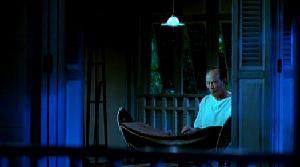
The Overture (Ittisoontorn Vichailak, 2004)
Thai Title: Hom rong
Thai filmmaker Ittisoontorn Vichailak's The Overture is inspired by the life of 18th century ranad-ek virtuoso player Luang Pradit. The events and characters presented in the film are entirely fictitious, giving Vichailak much liberality in creating a story so pleasant and admirable that I sometimes wonder why the film was even made at all. There's not a single ounce of authentic conflict or a granule of anything sincerely exciting that I wished for the impossible: that the main character start discovering the pleasures of opium and steer this overblown Thai film into its proper niche consisting of recent treacles Ray (Taylor Hackford, 2004) and Walk the Line (James Mangold, 2005).
The Overture is basically the life story of fictional Sorn (Anuchit Sapanpong), a naturally gifted musician who discovered his affinity with the traditional Thai musical instrument ranad-ek when a butterfly led him to the instrument. From then on, Sorn just keeps on improving and improving until he finally meets his match with the nearly invincible Bangkok-famous ranad-ek player Kun In (Narongrit Tosa-nga), who literally conjures mighty winds and strong rain when he plays the traditional instrument. Sorn is discovered by a local monarch and is recruited to the royal band, finally testing his playing prowess against Kun In, the local monarch's rival's champion player. Sorn's story as a young ranad-ek player is interweaved with the experiences of an older Sorn (Adul Dulyarat) with the Cultural Revolution of Thailand. Just before the Japanese Occupation of Southeast Asia, the Thai government released an order forbidding the playing of any traditional music insisting that such is obsolete and is not in tune with the government policy of "civilizing" Thailand.
It's all very uninterestingly told. No narrative surprises, it's as if Vichailak was conjuring scenarios out of nowhere, the determinant of the scene's being screen-worthy is if it can compare to the cheesiness of the worst family fare Hollywood can come up with. The writing doesn't add anything to the whimsical quality of the plot. Most of the characters merely serve as instruments to further the emotional whoring Vichailak seems to be interested in: we have the trustful and intellectually sub par friend (both in the young and old Sorn's story lines), there's the indefatigable teacher, the stern yet ultimately humanist opponents (Kun In in the young Sorn's storyline, the military officer in the old Sorn's storyline).
Perhaps the only saving grace for the film (well, aside from the beautiful music which should be a requirement for any music-related film) is the gorgeous cinematography. The film is beautifully photographed, perhaps too beautifully photographed. There are certain scenes wherein the characters are so luminously shot that it no longer looks like a feature film, but probably a commercial for a shampoo or a beauty product. While the film is always easy on the eye, it adds to the level of implausibility for the film, which probably adds to the reasons why i disliked the film so much.
In the end, I must insist that despite all its faults, there is still a way to enjoy the film. If one doesn't take the film seriously, forget the fact that Vichailak actually made this as a historical drama, and regard this as a Shaolin Soccer-clone (only this time, wooden xylophones are the subject of deathly battles), it can actually be quite enjoyable.
0 comments:
Post a Comment